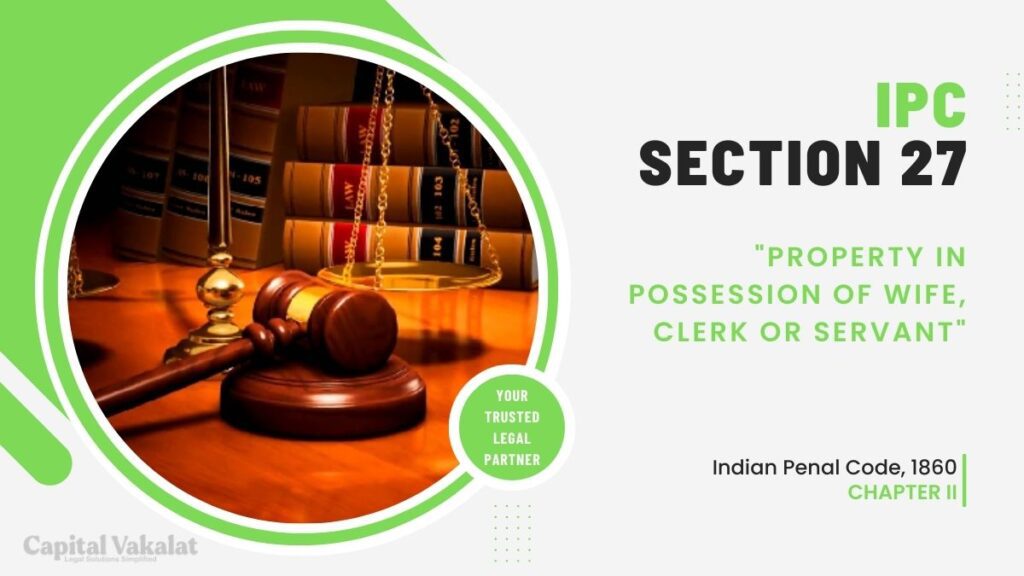In the realm of legal statutes, the Indian Penal Code (IPC) stands as a cornerstone, outlining the framework of criminal offenses in India. Among its provisions, Section 27 assumes significance for addressing the intriguing scenario of property held by a wife, clerk, or servant.

Let’s delve into the depths of Section 27 IPC and explore its implications.
Understanding Section 27 IPC
Section 27 of the IPC is a provision that deals with the legal interpretation of the term “possession.” According to this section, when property is in the possession of a wife, clerk, or servant, it is deemed to be in the possession of the person who has control over such individual, unless it is proven otherwise. This provision aims to prevent individuals from using intermediaries to hide or manipulate their ownership of property, thereby evading legal responsibilities.
The Role of Possession
Direct vs. Indirect Possession
The distinction between direct and indirect possession is crucial to comprehend the essence of Section 27 IPC. Direct possession implies physical control over the property, while indirect possession refers to control exercised through another person. The latter often becomes a point of contention in legal disputes, as it requires establishing the true owner’s intention and influence over the intermediary.
Spousal Ownership
Economic Independence vs. Fraudulent Possession
When it comes to property held by a wife, the underlying motive behind the possession plays a pivotal role. If the wife possesses the property as a result of economic independence or rightful acquisition, the provision does not apply. However, if the possession is a means to shield the husband’s assets from legal actions or creditors, it could be deemed fraudulent, falling under the purview of Section 27.
Clerks and Servants
Principal-Agent Relationship
In the case of property in the possession of clerks or servants, the principle of agency comes into play. The employer or principal is considered to be in possession of the property entrusted to their clerk or servant, as long as the latter is acting within the scope of their duties. This ensures that individuals cannot exploit intermediaries to evade legal consequences.
Legal Implications
Preventing Fraudulent Transactions
Section 27 IPC acts as a safeguard against fraudulent transactions by unveiling the true intent behind the possession of property. It discourages individuals from using intermediaries to conceal ownership and assets, thereby maintaining transparency in financial matters.
Ensuring Accountability
By attributing possession to the person who exercises control over intermediaries like wives, clerks, or servants, the provision ensures that individuals remain accountable for their assets. This prevents individuals from manipulating legal proceedings by claiming ignorance of possession.
Challenging the Provision
Balancing Rights
Critics argue that Section 27 can infringe upon an individual’s right to privacy and autonomy. It can lead to situations where legitimate possession is misconstrued as fraudulent. Striking a balance between preventing abuse and safeguarding individual rights is imperative.
Conclusion
Section 27 IPC acts as a powerful tool to unravel the complexities surrounding property possession by wives, clerks, and servants. Its intricate framework prevents misuse and ensures accountability while striving to strike a balance between legal integrity and individual rights.
Certainly! Here are some external resources where you can find more details about Section 27 IPC and related legal matters:
- Indian Penal Code – Section 27 A direct link to the official text of Section 27 of the Indian Penal Code, providing the legal wording and context.
- Understanding Property Possession Laws An informative video explaining the nuances of property possession laws, including insights into Section 27 IPC.
- Analyzing IPC Section 27 A detailed analysis of IPC Section 27, discussing its interpretations, implications, and case laws.
- Spousal Property Possession An in-depth guide on spousal property possession, delving into the legal aspects and how Section 27 IPC applies.
These resources offer a wealth of information for those seeking to understand the intricacies of Section 27 IPC and related topics.
FAQs
Can indirect possession be proven in court?
Yes, indirect possession can be proven in court through various pieces of evidence, including financial transactions, communication records, and witnesses.
Does Section 27 apply to property held by family members other than spouses?
No, Section 27 specifically addresses property held by a wife, clerk, or servant. It does not apply to property held by other family members.
Can an individual be held liable for possessions they are completely unaware of?
Under Section 27, an individual can be held liable for possessions they are unaware of if it can be proven that they exercise control over the intermediary who possesses the property.
What is the primary objective of Section 27 IPC?
The primary objective of Section 27 IPC is to prevent individuals from using intermediaries to hide or manipulate their ownership of property, thereby evading legal responsibilities.